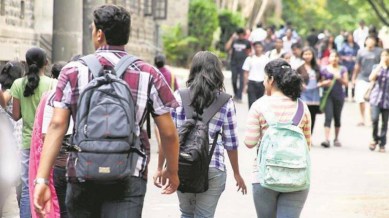Stay updated with the latest - Click here to follow us on Instagram
No protest rule: PU students to begin indefinite protest today
Students call undertaking ‘undemocratic’, demand immediate withdrawal; varsity defends it as a ‘reasonable step’

Written by Shruti Bedi
With no response yet from the Panjab University administration over the ongoing affidavit controversy, students have announced an indefinite protest from October 30 at 1 pm outside the Vice-Chancellor’s office. They are demanding the withdrawal of an undertaking that bars first-year students from participating in campus demonstrations, calling it “undemocratic” and a violation of their constitutional rights.
monthly limit of free stories.
with an Express account.
Student representatives said the protest would continue until the university “acknowledges the students’ voice”.
The petition that started it all
The controversy began in June, when the university’s Handbook of Information for the new academic session introduced a clause requiring first-year students to sign an affidavit restricting their right to protest on campus. Many believe the move stems from last year’s agitation over the university Senate — the main governing body — which has remained inactive for over a year.
Leading the legal challenge is Archit Garg, former vice-president of the Campus Students’ Council, who has petitioned the Punjab and Haryana High Court. Garg has argued that the undertaking violates Article 19 of the Constitution, which guarantees freedom of speech and peaceful assembly.
“Protests are not entertainment. They become necessary when communication channels with the administration fail,” Garg told The Indian Express. Questioning why the affidavit targets only students, he added, “Teachers have protested, clerical staff have protested — why are only students being made to sign this undertaking? It clearly shows where the administration wants to draw the line.”
On the silence of Campus Students Council president Gauravveer Sohal, who belongs to the ABVP, Garg said, “It’s disheartening. Representatives we elect are supposed to stand for students, not their political parties. We’ve seen marches, hunger strikes, dharnas — and yet, there’s silence from the one voice that should have led this fight. It feels like betrayal.”
Clauses that have caused outrage
Several clauses in the affidavit have triggered anger among students. Clause 2 confines demonstrations to a “designated area” near the Health Centre and Police Chowki — a move students say undermines the visibility and impact of protests. Clause 4 limits the volume of slogans “to avoid noise pollution,” which students argue defeats the very purpose of protest.
Clause 6 bars “outsiders or strangers” from joining protests — a responsibility, students say, that lies with the administration, not them. Most controversial is Clause 11, which allows penalties such as cancellation of admission, exam bans, and even campus entry restrictions. Students say such provisions create “an atmosphere of fear, not dialogue”.
Departments divided
Departments across the university have reacted differently. At the English Department, 90 of 110 students signed a collective letter to the Head of Department refusing to comply with the undertaking. At Philosophy Department, students who did not sign were allegedly denied ID cards.
At UILS, students said signing the affidavit was mandatory during admission. Department representatives Siddharth Choudhury, Nipun Suri and Harnoor Kaur said the administration justified it by citing “security concerns” and a need to identify “criminal-minded” students.
“That’s the problem,” said Choudhury. “Students raising questions are being treated like troublemakers. A university should strengthen democratic values, not suppress them.”
Harnoor added, “Targeting first-year students is deliberate — they’re new, unaware of their rights, and easier to control.”
Calling the restrictions “ironic,” Nipun said, “Across India, students raising their voices are being labelled anti-nationals. That’s not democracy. We don’t get clean water, the washrooms are unhygienic, and our fees keep rising. Protests are often the only way to make the administration listen.”
University’s stand: setting boundaries, not bans
Panjab University Registrar Y P Verma defended the affidavit, describing it as a “reasonable step” to ensure peaceful demonstrations. He said the undertaking targets students “who create chaos, carry weapons, or damage property during protests”.
Dismissing claims that it violates the Panjab University Act, 1947, Verma said, “These aren’t regulations but administrative directions.” Comparing it to Chandigarh’s designated protest site in Sector 25, he added, “Just as the city has a rally ground, the university has given students a spot near the police chowki to hold protests.”
Verma claimed most students have complied, and that “only around 10 per cent, mostly those linked to political groups, are opposing it to attract attention”. Similar systems, he said, exist in institutions like AIIMS. “The goal isn’t to silence students but to ensure protests remain peaceful and don’t harm the university’s image.”
The next hearing in the Punjab and Haryana High Court is scheduled for November 11. Until then, both students and the administration remain firm in their stands — a standoff that could define the future of student activism at Panjab University.